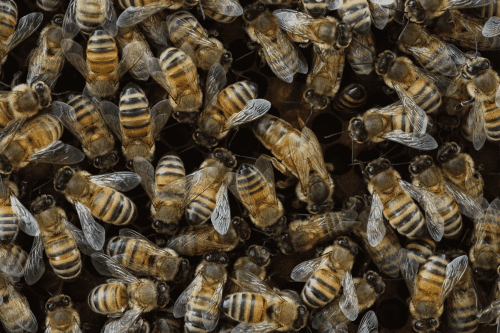Bees, Honey, GMO And
Codex Alimentarius
I was sent the following piece by Scottish beekeeper, Eric McArthur.
It's a brave and excellent article......do read!
The Codex Alimentarius Commission
The Best Kept Secret Ever, Pertaining to Food Regulation
By Eric McArthur
I was recently introduced to the above Commission, which when I started to ask around about it of friends, acquaintances, professional contacts, medical practitioners and ultimately politicians - even my barber, I was astounded to discover that few if any of those questioned, like myself, had even heard of Codex let alone understood the significance of the organisation.
Perhaps I was asking the wrong people!
Beekeepers also should have some knowledge of Codex Alimentarius, since as food producers, viz: honey, they should be aware of the tight regulations defining exactly what honey is; its origins, its constituents, qualities and the parameters which honey must meet to be deemed saleable as a pure honey product.
Scope Of Codex Rules
The
Codex rules cover the complete range of extremely demanding tests which may be
carried out on honey to determine adulteration or spoilage caused by heating
and over heating.
These tests are carried out to determine that levels of key constituents in honey fall within the pre-determined levels established for pure unadulterated, unspoiled honey; substances such as HMF (Hydromethylfurfuraldehyde), diastase and invertase, which are extremely sensitive to temperature.
Water content is also an important criterion: Honey is also screened for adulteration with HFCS (High Fructose Corn Syrup) and any other substances which fall out-with the Codex definition of honey.
So far so good – beekeepers should be grateful for such a clear cut reference regarding their prized product.
However, when the detail of Codex is scrutinised another less benign picture emerges which gives cause for pause.
Codex, despite its origins as a set of regulations based on the Napoleonic Code, which is a positive code of practice; if a list is drawn up of permitted items, anything not on this list is forbidden. Whereas under Common Law anything not forbidden in a list is permitted.
Origins of Codex Alimentarius
The origins of Codex Alimentarius lie with the Austro-Hungarian Empire.
Due to disputes relative to food quality and food standards generally, Codex Alimentarius was set up as a trading standard within the Austro-Hungarian Empire in 1893 and employed to settle disputes relating to food up until the start of the First World War.
Codex in its present form was resurrected by Fritz de Meer, the former CEO of I.G. Farben, who was sentenced to 6 years imprisonment for Crimes Against Humanity at the Nuremberg War Crimes Trials after the Second World War.
The organisation which oversees Codex is the World Trade Organisation (WTO), under the auspices of the United Nations (UN).
Further The rules of Codex Alimentarius have virtually nothing to do with Consumer Protection, it is purely a Trade Commission whose prime aim is to enable Free World Trade.
Who Benefits From Codex?
Codex has some virtues relative to food quality, however there are aspects of Codex that need to be examined closely, and which don‘t bear up to scrutiny.
Numbering among the key beneficiaries of the Codex regulations, which originally were purely voluntary, but which after the formation of the WTO in 1995 became mandatory by default, are; Monsanto, Bayer, BASF, GlaxoSmithKline, Welcome, Pfizer and many other household names in the pharmaceutical, bio- technical and bio- agricultural fields.
Despite the tight definition and control of food regulations, there are glaring omissions in the Codex rules primarily in the fields of GM foods, pharmaceutical and chemicals.
There is great pressure being brought to bear to dilute the standards required for the labelling of foods with a GM content.
There is great pressure being brought to bear on Food Supplements, including vitamins, minerals, nutritients and Foods for Special Dietary Uses.
Codex
rules preclude any claims being made
that a normal diet does not have sufficient nutrition for people with Special Dietary needs and thus at a
stroke denies patients suffering from ailments like cardio-vascular, cancer or
diabetes etc access to such food
supplements.
Worse, under Codex vitamins, minerals and nutrients for special dietary needs are now classed as poisons.
However the pharmaceutical multis have very generously been excluded
from such Codex regulations and patients are able to purchase their high priced
patented products recommended for these conditions.
Regarding GM based food the real test of the power of Codex appeared in 2003.
The principles of Codex for genetically modified foods, which were adopted at that time, were instrumental in the US, Canada and Argentine launching and winning a trade dispute at the WTO against the European Union.
Further, future guidelines for GM foods will contribute to making such foods, which comply with the regulations mandatory for all WTO member countries.
The three countries mentioned above are now pushing hard that there be no requirement for food manufacturers and exporters of GM foods to disclose GM content in their products.
Thus by default, while the world population sleeps, the big GM multis achieve their goal - the universal consumption of their GM foods. Unlike conventional foodstuffs GM crop seeds can be and are already well covered by patents.
Pesticides and Chemicals are out-with the mandate of Codex and in this field the disregard for Consumer Protection is quite dramatically demonstrated:
- despite 127 Nations agreeing to forbid the use of nine of the worlds most dangerous persistent organic chemical pollutants (POPS); chemicals which are so dangerous to human health that the agreement to ban was unanimous: Under Codex seven of these nine chemicals have been reinstated for use; hexachlorobenzine, toxaphen, aldrin, dieldrin, pentachlorophenol, endrin and mirex.
What About Organic And Codex?
Organic foods are increasingly being targeted by Codex.
Rules governing the natural quality of organic foods are systematically being undermined and the Codex Committee on Food Labelling is moving to permit substances like sulphur dioxide, which is a known allergen; sodium nitrite and sodium nitrate, which are potentially carcinogenic and have been implicated in hyperactivity in children; carrageenan which is associated with ulcers and cancerous tumours in the digestive system.
Codex has given the Green Light to the use of ethylene for the production, processing and marketing of Organic Foods.
Thus moving this industry toward WTO enforced acceptance of the same dubious unnatural standards that non- organic foodstuffs are subject to.
By reducing the high standards expected of organic foods the market is opened up to large non – organic food producers, who see the opportunity for higher profits on the back of the high reputation for purity which organic produce enjoys at present.
In addition of course, organic produce does not contain pesticide residues or genetically modified organisms. On a more sinister note – good consumer health is not in the interests of the ‘health care’ industries.
The
demand for high quality organic produce is ultimately a threat to the chemical
and pharmaceutical industries according to
Dr Paul Taylor of the Dr Rath Health Foundation, because as well as promoting good health, organic products result in lower demands for pesticides, veterinary drugs and GM foods and thus are a continuing threat to multi national profits.
It would seem that Codex once ratified will enforce the routine treatment of all dairy cattle, with recombinant bovine growth hormone, resulting of course in all milk being contaminated by this hormone.
By the same token all animals in the human food chain, be they furred, feathered or finned will be treated with sub-clinical antibiotics. All food, which is not eaten fresh, under Codex will be irradiated.
And so......
However well intentioned as Codex was, as a set of voluntary food regulations, somewhere between its resurrection and the present time the agenda altered virtually unnoticed.
Instead of the Codex Alimentarius remaining voluntary; these Regulations suddenly became mandatory by default, because any sovereign State which is not Codex compliant, in a dispute loses its case however justifiable and correct that case may be.
In 1962 the powers behind the Codex Alimentarius Commission, which presides over some 27 active subsidiary committees and ad hoc intergovernmental task forces, decided to embark on an ambitious program setting out comprehensive rules for all food consumed in the human food chain.
The present aim of the project, which was initially proposed as a voluntary code is to have the Codex Alimentarius rules in place by early 2010 at which time Codex would be ratified world wide.
Once ratified according to Dr Rima Laibow, President of the American National Association of Nutrition Professionals (NANP) – (ww.Heathfreedom.org), Codex is cast, not just in stone, but the equivalent of solid rock – Codex it seems is not subject to the normal rules governing treaties between countries.
Codex can NEVER be repealed!
Is this a good idea?
If you found this page helpful or interesting, I'd really be grateful if you would share it with others - if not this page, perhaps another, such as Gardening For Bees.
Thank you so much :) .

